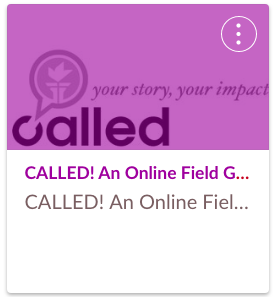As students at SPU, you may have received an email or seen on your Canvas homepage something called “CALLED! An Online Field Guide (CALLED).”
Many questions have been raised about the purpose of this online class.
First, what is CALLED and how did it come about? It has two aspects: surveys, and an online Canvas modules. Taking the survey emailed to you merely unlocks your Canvas modules.
Dr. Lynette Bikos, supervisor and vital part of CALLED, says that that the program came out of a dedicated task force, which spent four years planning and forming the program.
Through taking the survey emailed to students and completing the Canvas modules, CALLED is able to collect student information from your responses to use for their own university-wide evaluation. Students can choose to give consent that allows the program to access your responses.
There are also paper copies of CALLED available. These booklets were a product of the task force and essentially offer career advice and other useful information to students as they attempt to discern their career path, but the task force wanted to take it a step further.
“We were concerned students would lose it or forget to use it” noted Bikos of the paper booklets. So, the task force implemented a Canvas course to help give students constant digital access to interactive resources such as how to build a Linkedin presence to how to give an elevator speech.
CALLED’s purpose, according to Bikos, is to “provide students with career exploration information, resources and assignments. Students will always have access to their responses and can go back and view their work in CALLED even into alumni years.”
If a student “wrote a really good cover letter your junior year and you want to go back and look at it, it will still be there,” noted Bikos of the capabilities of CALLED.
One other question students had was if the CALLED modules are graded. According to Bikos, all CALLED modules are optional, but are highly suggested to students. CALLED does not influence your GPA.
Instead, CALLED is a resource that is “ever present in the student’s environment” Bikos said. She expects students to use CALLED “in the same way we expect students to use the library.”
The only way students are graded on their CALLED modules is if a professor or class uses CALLED as a part of the curriculum. Then students are subject to be graded on their responses.
For example, the psychology department at SPU has committed to having their students complete all four years of the CALLED program.
The purpose of CALLED was to make career planning accessible to students. The modules guide students through activities of self-reflection as well as give them tools such as how to write a cover letter or build a resume.
Bikos hopes that by reviewing students answers over the course of four years, she can see how students change over time.
The CALLED team will be able to see how a student’s “vocational identity changes,” say, “before and after an internship,” and ask if that change “is that the same for everyone” Bikos explained.
There is one caveat; if students do not take these surveys seriously or take time when answering the modules, then how can CALLED rely on students responses for their data analysis?
Regarding this problem, Bikos said that “we know that students will engage at different levels and we know that that is totally normal,” but Canvas “has an analytics section and we can look and see how much time students are spending on each page. … This gives us a good degree of individual engagement.”
What Bikos hopes that students take away from CALLED is that “students take twelve minutes and just browse through it” so that “in six months from now and a student needs to write a resume, [but] the career fair is tomorrow, students can go ‘Oh wait! I think there is something in the CALLED Field Guide!’”
By exploring what tools exist in the CALLED Online Field Guide, students will be able to rely on CALLED’s resources in the future and hopefully begin planning purposeful careers.
















































































